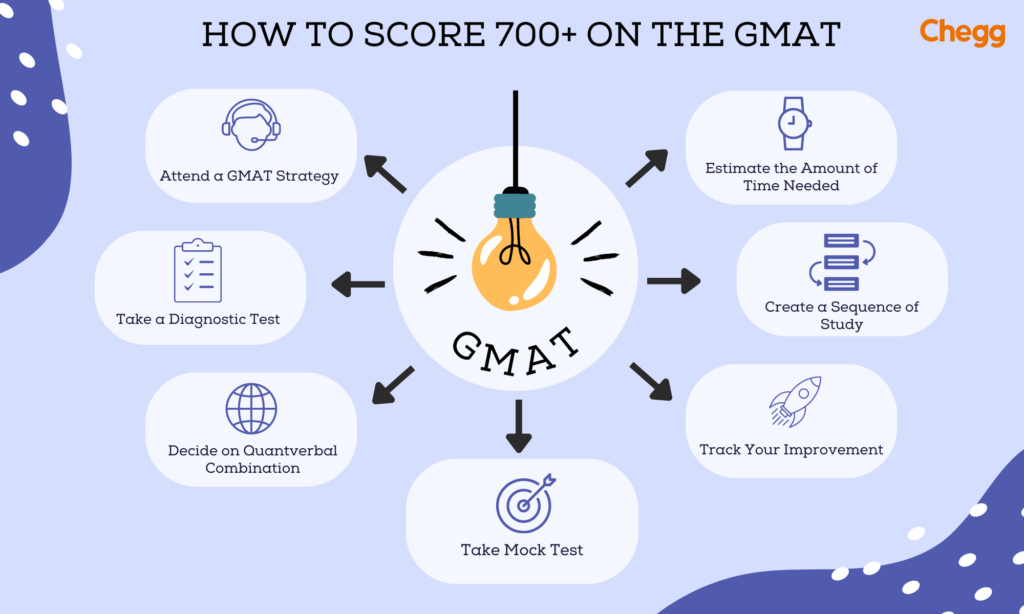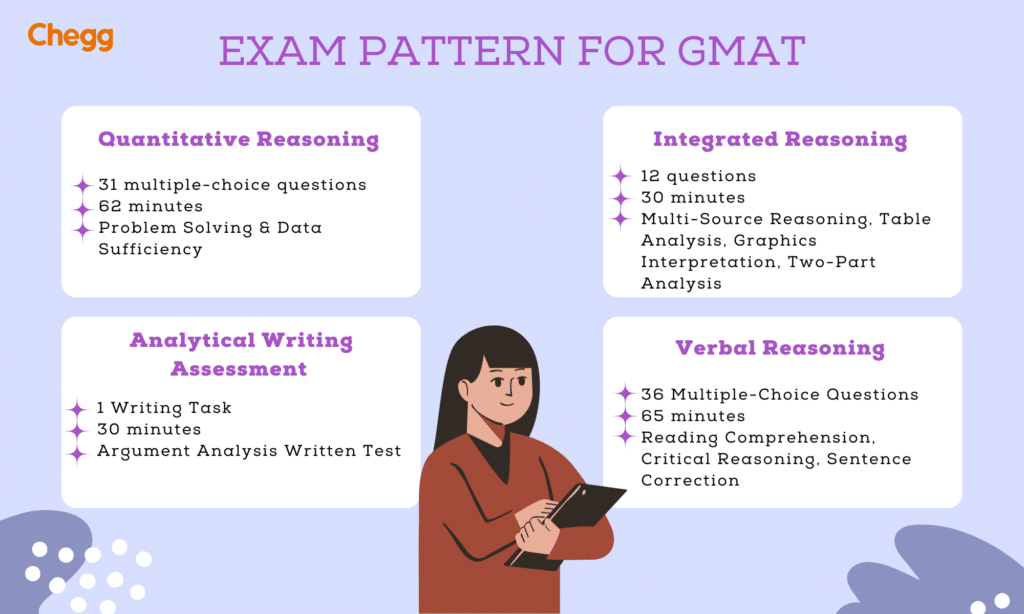
Table of Contents
You are all set to go to your dream college to pursue your MBA career. You have researched the best colleges, shortlisted the colleges suitable for you and even started drafting application letters to send.
But did you prepare for the most critical step?
Preparing for the GMAT exam is that step, the exam whose scores decide what type of MBA college you will get into. And GMAT preparation is something that every MBA aspirant must start early.
Over 115,286 students were given GMAT in 2024, and with passing years this number has only increased. If you are also someone who is preparing for GMAT, then here are some of the best GMAT test preparation tips. Do read along and score 700+ on your GMAT exam.
|
GMAT Overview | |
| GMAT Full Form | Graduate Management Admission Test |
| Conducted By | GMAC |
| Age Limit | 18+ and written guardian consent for below 18 |
| Educational Qualification | Bachelor’s degree |
| GMAT Test Duration | 3 hours 7 minutes |
| Sections in GMAT Exam | Analytical Writing, Integrated Reasoning, Quantitative Reasoning and Verbal Reasoning |
| No. Of Attempts | 8-lifetime attempts |
How to Apply for GMAT Exam?
- Choose Mode of Exam: There are two exam delivery methods – online or at a test centre. Choose the option convenient for you.
- Create an Account: Create an account at https://www.gmac.com/. Fill in the basic information asked to move forward with your profile.
- Register for the GMAT exam: Once you fill in your basic information, you will find a register option. Register yourself by clicking the register option. Now, select a convenient date and time for your exam. Complete your registration by paying the fees
Know About: 15 Entrance Exams to Give After Graduation

12 GMAT Preparation Tips to Top the Exam
GMAT is an effortless exam if you can decode the secret way to prepare for it. Here are some GMAT preparation tips to do so.
1. Create a Study Plan
Developing a how to study for the GMAT plan before the exam application is the most crucial exam tip. And do prepare it beforehand, this way your studies wouldn’t get disrupted between application writing, essay and resume sending etc.
2. Learn About the Test Sections
Although you might have a gist about different exam sections it’s always great to confirm things. So, before studying, learn about the test sections, types of questions, and other details of the GMAT exam preparation.
3. Choose Genuine GMAT Preparation Materials
It is always suggested to students choose the GMAT preparation materials from the official website. Because the materials from other sites might not meet the requirements for the test, also, picking materials from the official website will help you score more marks as the material is curated by GMAT experts themselves.
4. Know Your Strengths
Having knowledge of your strengths and weakness before exams is crucial. It is advised to take the official GMAT Preparation Guide Series to assess your skills and identify your areas of strengths and weaknesses. After analysing your GMAT strategy, create a tailored study plan to brush up on the areas where you need to improve your abilities to crack the GMAT.
5. Study Sections Separately
The GMAT exam consists of several sections and preparing well for each section is crucial. So, during the GMAT preparation, make sure to concentrate on a single topic at a time. Complete one section before moving on to another, changing between two or more sub-sections at once will only lead to confusion.
6. Track Your Time
Keeping track of your time is essential for your performance in the GMAT exam as you will get a limited amount of time. For instance, if you know that the verbal portion of the test will be difficult for you, work on your vocal abilities while making sure you can use them quickly. Start keeping track of time once you’ve done enough GMAT test preparation and had a solid grasp of the topics.
7. Improve Your Visual Literacy
The best way of GMAT preparation is to learn how to interpret symbols, charts, and tables and master visual literacy. As GMAT frequently includes various kinds of visual data, being able to decipher it is a crucial skill the GMAT rapidly. You could also come across non-standard mathematical notations (or symbols related to a problem) on the GMAT Quant section of the exam. That’s why it’s critical that you are comfortable with visuals and can maintain composure during the test.
8. Learn Mental Math
Use mental math for the quantitative component. While studying for the GMAT, avoid using your calculator whenever possible. Train your brain to perform calculations instead. You won’t have a calculator during the GMAT’s fundamental Quant part, so developing your mental math skills is crucial.
9. Create an Error Log
After each attempt, an error log will help you capture and analyse the question’s behaviour and technicalities. The error log may be the most neglected and underappreciated tool in GMAT preparation. However, those who have mastered the art of maintaining one regularly have gained invaluable insights into their study habits and have made precise modifications, aiding them more swiftly and efficiently in reaching their target GMAT score.
10. Don’t Miss Questions
Remember that there is a penalty for missing a section, and your score may go down with each question you don’t attempt. Avoid getting caught up in the trap of questioning, even if you are responding to each one appropriately. Do your best, of course, but follow a pace plan. Spend no more than 2.5 minutes on any single question.
11. Dismiss When in Doubt
Don’t waste time when you encounter questions you don’t know the answer to. When in doubt, rule out the incorrect answers to move closer to the correct answer. Continue to the following question by picking the best option from the remaining options. Prepare a “guessing approach” during the GMAT preparation just in case you run out of time (despite your most satisfactory time management plan) to prevent unnecessary GMAT score penalties.
12. Be Consistent
Consistency is the key; you must work hard if you want to accomplish good GMAT scores. This exam cannot be passed by memorisation alone. It includes skill development, which can only occur with consistency and discipline. Studying for 30 minutes a day, six days a week is preferable to studying for three hours one day and then going six days without studying. So be consistent and be a diligent student!
Recommended Reads:
How To Study for Long Hours
Top GMAT Accepting Colleges
Why Choose MBA After Engineering?
What are the Highest-Paying MBA Jobs of 2025?
Know About the Option of Distance MBA

GMAT Study Essentials
Preparing for the GMAT can feel tough, but with the right steps, it can be a smooth and rewarding process. Here are some simple tips to help you get started:
Easy GMAT Study Tips
- Learn the Exam Structure – Understand the different parts of the GMAT: writing, reasoning, math, and verbal questions.
- Set a Goal Score – Check the average GMAT scores for the schools you like and aim for a score in that range.
- Make a Study Plan – Create a study schedule and focus more time on areas you find difficult.
- Use Official Study Guides – Start with official GMAT books and online tools.
- Practice with Full Tests – Take practice exams regularly to get used to the format and build endurance.
- Improve Weak Areas – Spend extra time practicing the sections where you score lower.
- Learn Test Tricks – Practice tips like managing time and making smart guesses.
- Stay on Track – Stick to your study schedule and set small, achievable goals to keep motivated.
- Join Study Groups – Join online groups to share advice and resources with other GMAT students.
- Take Care of Yourself – Get enough sleep, eat well, and take breaks to avoid stress.
Recommended Resources
- PrepScholar GMAT: Personalized online prep.
- Manhattan Prep: Detailed study guides and practice problems.
- Magoosh GMAT: Video lessons and practice questions.
GMAT Exam Pattern
Here’s the GMAT exam format:
| Section | Duration | Number of Questions | Question Types | Focus |
|---|---|---|---|---|
| Quantitative Reasoning | 45 minutes | 21 | Problem-Solving | Analyzing data and drawing conclusions using reasoning. |
| Verbal Reasoning | 45 minutes | 23 | Reading Comprehension, Critical Reasoning | Reading, understanding texts, and evaluating arguments. |
| Data Insights | 45 minutes | 20 | Data Sufficiency, Multi-Source Reasoning, Table Analysis, Graphics Interpretation, Two-Part Analysis | Analyzing and interpreting data in real-world scenarios. |
Optional Break
| Duration | When to Take |
|---|---|
| 10 minutes | After the first or second section |
Scoring
| Score Range |
|---|
| 205 to 805 |
Section- Wise GMAT Preparation Tips
Quantitative Reasoning Tips
Here are some GMAT tips to prepare well for the Quantitative Reasoning section of the exam.
- Familiarize yourself with the structure and format of the quantitative reasoning section, by practicing from workbooks.
- Review and understand the mathematical concepts and focus on topics such as algebra, arithmetic, geometry, and data interpretation.
- Develop problem-solving techniques to tackle different question types efficiently.
Verbal Reasoning Tips
Great GMAT preparation includes command over verbal reasoning too, using these tips you can achieve that.
- Understand the syllabus of the verbal reasoning section, such as reading comprehension, critical reasoning, and sentence correction.
- Practice reading and comprehending complex passages from various subjects, such as science, social sciences, business etc.
- Improve your vocabulary by reading and incorporating new words into your everyday language.
Integrated Reasoning Tips
Here are some GMAT preparation tips for the Integrated Reasoning section.
- Stay informed about the topics of the Integrated Reasoning syllabus before studying.
- Strengthen your analytical skills as the IR section is for assessing your ability to analyse information from multiple sources.
- Practice using the original material provided by the GMAC for Intergrated Reasoning.
Analytical Writing Assessment Tips
Writing is an important part of the GMAT exam you can excel in this by following these GMAT tips.
- Understand the essay prompts and practice them using study material provided by GMAC.
- Before writing, take a few minutes to brainstorm and outline your ideas.
- Work on improving your writing skills by practising regularly. Focus on clarity, coherence, and conciseness.
Recommended Reads:
Top MBA Colleges in the USA in 2025
Best Study Abroad Guide for Indian Students

Practice Tests and Review
Here’s the information in a simple format to help with GMAT preparation:
| Preparation Idea | Why? | What to Do |
|---|---|---|
| Full Practice Tests | Practice full tests to feel like the real GMAT and improve timing. | Include all sections: Math, Verbal, Integrated Reasoning, and Writing. Keep the difficulty similar to the real exam and mix question types. |
| Section Practice Tests | Focus on one section at a time to improve weak areas. | Create separate tests for Math, Verbal, Integrated Reasoning, and Writing. Use different question types and gradually increase difficulty. |
| Simple Answer Explanations | Understanding mistakes helps you learn and improve. | Show step-by-step solutions for Math. Explain why answers are right or wrong for Verbal and Integrated Reasoning. Provide sample essays. |
| Progress Feedback | Track what you’re good at and where you need more work. | Use tools to track your scores. Offer personalized feedback, highlight strengths, suggest areas to focus on, and give time management tips. |
Motivational Quotes and Tips
Motivational Quotes
- “The only way to achieve the impossible is to believe it is possible.” – Charles Kingsleigh
- “Success isn’t the key to happiness. Happiness is the key to success. If you love what you’re doing, you will succeed.” – Albert Schweitzer
- “The future belongs to those who believe in the beauty of their dreams.” – Eleanor Roosevelt
- “Don’t just watch the clock; do what it does. Keep moving forward.” – Sam Levenson
- “The harder you work for something, the better you’ll feel when you achieve it.” – Anonymous
Tips for Staying Motivated
- Set Clear Goals: Know what score you want and keep it in mind.
- Make a Study Schedule: Plan when you’ll study and stick to it. Consistency is important.
- Take Breaks: Avoid getting tired by taking short breaks. They help you stay focused.
- Stay Positive: Keep a positive attitude. Remember how far you’ve come and celebrate small wins.
- Join a Study Group: Studying with others can help you stay motivated and give you new ideas.
- Imagine Your Success: Picture yourself getting your target score and the good things it will bring.
- Take Care of Yourself: Get enough sleep, eat healthy, and exercise. A healthy body helps a healthy mind.
Every step you take gets you closer to your goal. Keep pushing, and you’ll make it!
Get Success in Your GMAT Exam
Whether it’s a school test or a GMAT test for your dream college, it can feel overwhelming and you might feel nervous. But with the right guidance and perfect preparation, you can pass any exam. And if you follow the GMAT preparation tips listed here and start your preparation without any doubt, you can easily score above 700 in your GMAT Exam.
Get more tips and valuable resources in our Career Advice section to clear all your career dilemmas.
Frequently Asked Question (FAQs)
How long does it take to prepare for GMAT?
GMAT preparation takes time, hence it is advised to start preparing at least 2-3 months prior to the exams. The earlier your start studying the better your preparation will be. And it will also provide you with enough time to revise all your syllabus systematically just before the exams.
How to prepare for gmat exam?
If you want to score well in the GMAT exam, you need to follow certain steps to succeed. Here is how you can do this:
1. Get all information about the GMAT exam
2. Create a study plan and stick with it
3. Gather all the relevant study material for GMAT preparation
4. Take the diagnostic test to your strengths
5. Study each section systematically
How hard is it to score a 700 on GMAT?
If you want to score 700 or more you need to give 100- 300 hours dedicated to preparing for the GMAT exam. You need to start early and create a study plan that you can stick to. People who score well find the quantitative and verbal sections easier, so you can start from there.
Is GMAT a hard exam?
According to the data, the GMAT exam is challenging. Only 6% of the total applicants score more than 720 on GMAT. With a good GMAT strategy and Chegg’s Exam Prep, this should not be very difficult.
Do Indian Colleges accept GMAT?
Yes, Indian colleges do accept GMAT. Some of the top MBA colleges that accept GMAT are IIMS, ISB, XLRI, etc. The better your score, the better the college you can take admitted into.
To read more related articles, click here.
Got a question on this topic?